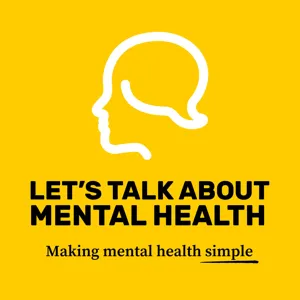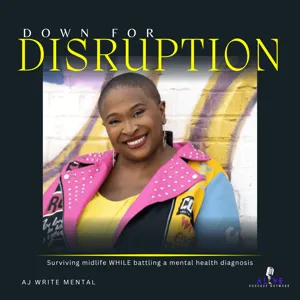Podcast Summary
Improve mental well-being through deep breathing: Deep breathing can reduce stress, enhance cognitive function, and help manage traumas. Try a simple exercise for relaxation and mental clarity.
Practicing deep and mindful breathing can significantly improve mental well-being, potentially reducing stress, enhancing cognitive function, and even helping to manage traumas. During our conversation with psychiatrist Dr. Patricia Gerbarg, she led us through a simple breathing exercise, which noticeably quieted the mind and induced a sense of relaxation. The importance of proper breathing is gaining recognition beyond anecdotal claims, with scientific evidence supporting its potential benefits for mental health. However, it's essential to remember that the quality of your breathing is not a one-size-fits-all solution, and individual experiences may vary.
Breathing exercises with longer exhales can improve mental health and reduce anxiety: Study led by David Spiegel found that practicing cyclic sighing breathing exercises, with longer exhales, led to improved mood and less anxiety, along with slower breathing rates, indicating a more relaxed state.
Breathing exercises, particularly those involving longer exhales than inhales, can have a positive impact on mental health and anxiety levels. This was discovered in a study led by David Spiegel, a professor of psychiatry at Stanford, during the pandemic when many people were feeling stressed. The study, which included over 100 participants, found that those practicing this type of breathing, called cyclic sighing, reported feeling more positive and less anxious than those who did not engage in the practice. Furthermore, objective measurements showed that their breathing rates slowed down, indicating a more relaxed state, even when they were not actively doing the exercises.
Breath work's impact on stress and mental health: Breath work reduces stress and improves mental health for some individuals, particularly those with depression and PTSD. Studies and personal experiences support its effectiveness.
Breath work, a simple yet effective practice, has been found to reduce stress levels on average, as indicated by multiple studies. This may not seem like a groundbreaking discovery, but for some individuals, particularly those dealing with serious mental health conditions like depression and PTSD, it can make a significant difference. The skepticism towards the potential of breathing exercises as a therapeutic tool was once shared by Dr. Patricia Gohberg, who was initially dismissive of her husband's obsession with the practice. However, after witnessing the transformative effects on her patients, she became a dedicated researcher and advocate for breath work. The evidence includes a study conducted by her and her husband, Dr. Richard P. Brown, which showed that survivors of the Southeast Asian tsunami experienced a decrease in depression scores after attending a breathing-focused workshop. More recently, they have been working with Ukrainian psychologists and their traumatized clients, who have reported improved sleep and the ability to help their children after practicing the techniques.
Breathing exercises for mental health: Breathing exercises can activate the parasympathetic nervous system, leading to relaxation and improved mental health conditions like depression and PTSD, by increasing GABA activity in the brain
Breathing exercises can have a significant impact on mental health conditions such as depression and PTSD. These exercises work by activating different parts of the autonomic nervous system, specifically the parasympathetic nervous system, which promotes relaxation. When we breathe out slowly, we trigger the parasympathetic response, which can lead to decreased heart rate, increased blood flow to the heart, and an overall sense of calm. Studies have also shown that slow breathing can increase the activity of a neurotransmitter called GABA, which helps calm nerves in the brain. This is a promising alternative approach to traditional mental health treatments, which often focus on talking through problems. Instead, breathing exercises offer a way to start with the body and work upwards towards better mental health.
Breath work: Not a one-size-fits-all solution for mental health: Breath work, including fast and slow techniques, can have mental health benefits, but it's not effective for everyone. Combining it with other practices may enhance its effects, and the debate on mouth breathing's impact on health continues.
While breath work shows promise in helping with mental health conditions like depression and PTSD, it's important to remember that it's not a one-size-fits-all solution. Studies suggest that various types of breathing, including fast breathing, may send important messages to the brain and have additional benefits when combined with other practices like slow movements or group therapy. However, it's essential to note that breath work doesn't help everyone and shouldn't be seen as a personal failure if it doesn't work for you. Additionally, the idea that mouth breathing is harmful to our health is a topic of ongoing debate, with some research suggesting potential negative effects, but more data is needed. Overall, breath work is a promising area of research, but it's essential to approach it with a nuanced understanding of its limitations and potential benefits.
Breathing through your nose could enhance memory formation: Breathing through your nose potentially activates memory-related parts of the brain, making it more effective for memory formation than breathing through your mouth.
Breathing through your nose instead of your mouth could potentially enhance your memory formation. This is because when you breathe in through your nose, the information reaches your olfactory bulb, which then sends a message to memory-related parts of your brain. This process is more effective than breathing through your mouth. The connection between smells and memories is a well-known phenomenon, and scientists have discovered that even when you're not smelling anything, your nose's neurons still fire when you breathe in through your nose. However, for mouth breathers, this process may not be as effective. While this research is exciting, more testing is needed to confirm the potential benefits of nose breathing for memory. If you often wake up with a dry mouth, indicating that you might be a mouth breather, it could be worth trying to breathe through your nose more to see if it makes a difference.
Nasal breathing and memory: Studies suggest a small improvement in memory when breathing through the nose, but the impact is not significant enough to make a noticeable difference in daily life
Breathing through your nose may have a small effect on improving memory compared to breathing through your mouth. However, the impact is not significant enough to make a noticeable difference in daily life. A study conducted by Arden found that people remembered an average of one extra odor when breathing through their nose compared to breathing through their mouth. But, the research on this topic is mixed, and more long-term studies are needed to fully understand the potential effects of nasal breathing on memory. The initial excitement about the potential memory-boosting benefits of nose breathing has been toned down, as the effect size is quite small.
Breathing through the nose offers benefits like reducing asthma risk, dental cavities, and snoring: Nose breathing reduces asthma risk, dental cavities, and snoring while mouth breathing may change face shape and increase dental cavities risk
Breathing through your nose instead of your mouth offers several benefits. The nose is designed to handle air, and it comes equipped with filters, warmers, and mucus to help moisten, heat, and trap potential pathogens. Nose breathing can reduce the risk of exercise-induced asthma, dental cavities, and even snoring. Mouth breathing, on the other hand, could potentially change the shape of your face during childhood and increase the risk of dental cavities. To help transition to nose breathing, especially during sleep, many people use mouth tape. While there's no guarantee it will convert you into a nose breather, it can help reduce snoring and improve sleep quality for some individuals. Always test it out during the day before using it at night.
Exploring the science behind deep breathing: Deep breathing can improve mood and help manage emotions, but the idea of breathing 'correctly' through the nose is not scientifically proven
Taking some time for slow deep breathing with nice long exhales can make us feel better, even on a crappy day. The idea that we're all breathing wrong and need to be nose breathers is not scientifically proven, and it's important not to take things too far. Even skeptics, like the hosts of Science Versus, have found benefits in practicing breathing techniques, especially when helping children manage emotions. For more information, listeners can check out the episode's citations in the show notes, which are linked to the transcript and include references to numerous studies on the topic. Science Versus, a Spotify Studios original, is available for free on Spotify and other podcast platforms. Listeners are encouraged to follow the show, give it a 5-star review, and dive into the citations for a more in-depth understanding of the science behind breathing.





